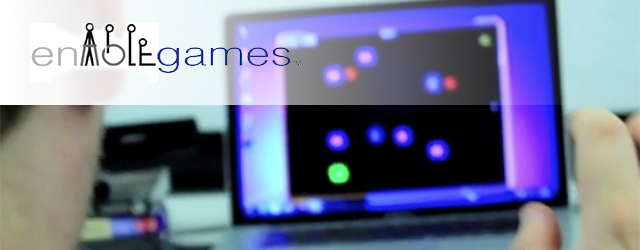Video Game Therapy — Drexel Professors Design Games For Cerebral Palsy Patients
While video games have often been saddled with the reputation of promoting a sedentary lifestyle, a group of Drexel University professors see the digital diversions as a way of helping patients with cerebral palsy to keep on moving.
The professors, with expertise ranging from game design to movement science, physical therapy and biomedical engineering, recently formed a startup company called enAble Games, with the goal of making web-based active video games that can be used as part of therapy or rehabilitation exercise sessions.
Get Moving
Children with cerebral palsy often experience decreased physical activity, motor skills and functional mobility. One of the main physical therapy goals for CP patients, according to Margaret O’Neil, PhD, an associate professor in the Department of Physical Therapy and Rehabilitation Sciences in Drexel’s College of Nursing and Health Professions who is one of enAble’s co-founders, is to keep them physically active in order to build physical stamina, strength and range of motion.
“As they age, children and youth should participate in longer periods of activity. The national physical activity guidelines recommend at least 60 minutes of moderate to vigorous physical activity daily,” O’Neil said. “Unfortunately, most youth show trends toward decreased physical activity and increased sedentary behavior as they enter adolescence. This trend is even more pronounced in children and youth with disabilities including CP. Therefore it is critical to identify or design activities for youth to increase the amount of time in physical activity and the intensity of the activity for a health benefit.”
To make a game that promotes physical activity, the team is availing itself of Microsoft’s Kinect technology. The system, which has been part of Microsoft’s Xbox gaming platforms since 2010, uses a series of motion sensing input devices –rather than a handheld controller – to let the user interact with the game through gestures and movements.
O’Neil, a licensed physical therapist, had previously used Kinect games as part of her research on physical activity in youth with cerebral palsy — but saw limitations in the games that existed at the time. But with co-founder Paul Diefenbach, PhD, founder of Drexel’s nationally ranked game design program in the Westphal College of Media Arts & Design; and with Robert Gray, former associate director of Drexel’s Entrepreneurial Game Studio; enAble Games is making games that are tailored to the abilities of patients with CP.
Read the full article here.





